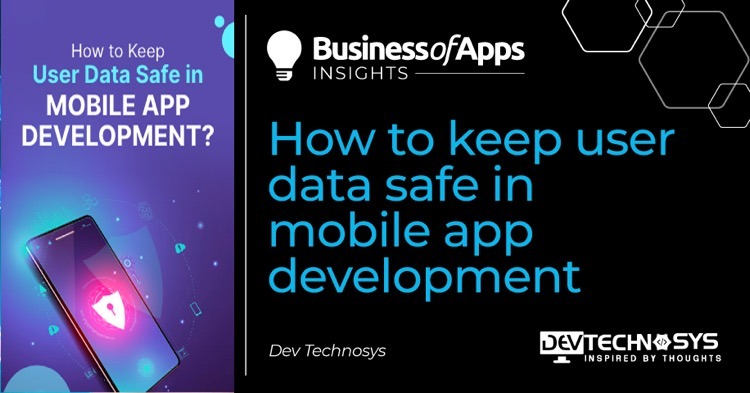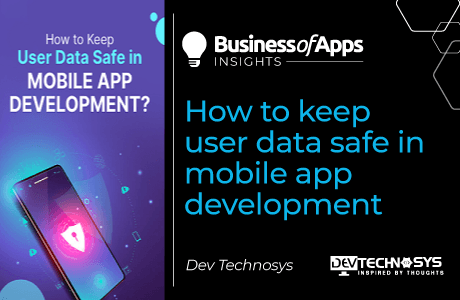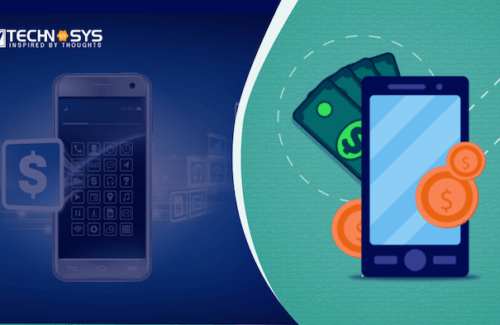While developing a mobile application, what’s the biggest challenge that businesses face? Users’ data privacy and security! Keeping the users’ data safe is one of the biggest concerns in today’s digital landscape. With the rise of Cyberattacks and breaches, data security management has become mandatory during mobile app development. As mobile application security is at risk today, hackers are trying new tricks and techniques to exploit vulnerabilities in mobile applications.
So, organizations must take the best security measures to keep their applications’ user data safe. According to the research, nearly 50% of organizations’ employees download one or two malicious applications. Also, approximately 40% of mobile apps remain vulnerable to cyberattacks. For this reason, users are more afraid of using a new application and cannot trust it easily. But there is a solution to it.
If you are developing a mobile app, try the following mobile app development security practices to keep your users’ data safe and protected.
What is mobile app security?
Mobile app security protects the application from external risks such as viruses and other cyber threats by incorporating standard security protocols. These malware and online dangers put financial and other sensitive data at risk of hackers.
In today’s digital world, mobile application security has also become vital. Personal information about users may be accessible to hackers through a mobile security breach. Security protocols are applied during mobile app development to ensure that none of the users’ data gets leaked or misused.
7 Mobile app development practices for securing user data
Want to build a mobile app that is completely safe and secure? Try the following mobile development practices for enhanced user data security.
1. Encryption of data & code
Bugs can generate through insignificant coding mistakes or testing oversights. It makes mobile apps susceptible to hacker exploitation. So, using data encryption while creating a mobile app is the best solution.
Code encryption and data encryption are the two types of encryption available. In code encryption, the text is changed into numerical code series. Data encryption, on the other hand, changes data into a form that is unreadable to hackers.
2. Error-free codes
As per professional mobile app developers, approximately 82% of the vulnerabilities in mobile applications are caused due to inappropriate coding practices. It demonstrates that the code requires high security, and mobile app developers should ensure it is 100% error-free before debugging.
Comprehending its architecture is one of the best techniques to safeguard the application or software. You can hire dedicated developers who test the application from different perspectives and ensure the code is safe. It will help you develop a secure application and protect your app users’ data.
3. Ensure high-level authentication
High-level encryption is a must when developing mobile apps. So, create an application that reminds users to periodically change their passwords. Add features like alphanumeric passwords as well. It increases security and adds a layered authentication procedure.
Developers can also add capabilities for biometric authentication or retina scanning. These two features leverage high-level authentication that is virtually impossible to circumvent. Another efficient technique to safeguard the app is OTP (one-time password).
4. Perform a strong security check
Verifying the mobile app’s usability and security before the launch is mandatory. Finding the application’s vulnerability is the aim. Even after the app has been released, frequent testing is advised.
To achieve a launch deadline, the developer’s team might occasionally test the software even though app vulnerabilities may endanger user security. To ensure perfect authentication and authorization processes, conduct code audits and testing.
5. Beware of third-party libraries
It becomes easier for developers to code using third-party libraries rather than constructing an application from scratch. Also, there is a tonne of free libraries that make calling specific functions easier. Be cautious when using such libraries, as you could expose your app to security issues.
When it comes to third-party libraries, be twice as cautious. Before incorporating the code into your app, properly test it and examine the library’s many versions. Once thoroughly examined or a new problem arises, many of the largest coding libraries still have security issues. Use several internal controller repositories and policy controls to shield your apps from potential weaknesses in these libraries. These regulations will assist in separating the data layer.
6. Control data sharing within apps
For developers wishing to transfer data between two or more apps, data sniffing has a lot of promise. Data transfer may be problematic, particularly if hackers figure out how you accomplish it and discover that it is unprotected.
Signature-based permissions can prevent needless interference while transferring data across programs you manage. The apps’ functionality is maintained as these permissions don’t require user action. Instead, they see if the data-accessing apps have the same signature and signing key.
7. Insert secure APIs
Finally, secure APIs are the last method to ensure client data security within your mobile application. APIs are the main method for transferring data between applications, the cloud, and consumers. Developers must guarantee the security of the code when utilizing third-party APIs.
Only allow the necessary applications to access APIs with data authorization. To secure your app’s API – Use a strong gateway or a central OAuth server to securely manage user authentication.
Implementing these strategies above will help you create a secure mobile application and save huge costs during mobile app development.
Final Thoughts
Developing a secure mobile application is just a matter of following the best mobile app development security practices. It helps to prevent vulnerabilities that might affect the application to a great extent. So, all business owners should begin with robust code that follows expert coding practices and explicit function calls. Besides, if you implement the above-mentioned mobile app development security practices, you will run a successful business application while keeping the users’ data safe and secure.
For professional assistance, you can contact a leading mobile app development company. The professionals will help you create a mobile application that is secure enough to comply with data protection laws and regulations.













